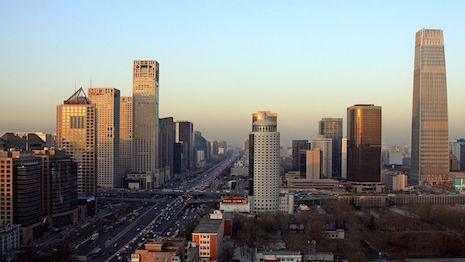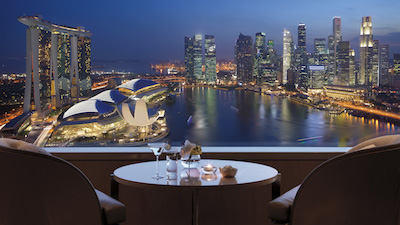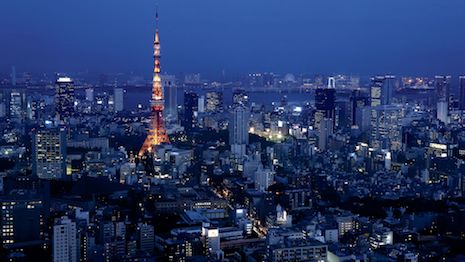 High-net worth individuals in Asia-Pacific are spending more money on travel. Image credit: Knight Frank
High-net worth individuals in Asia-Pacific are spending more money on travel. Image credit: Knight Frank
Travel has become one of the most important categories for high-net-worth individuals in Asia-Pacific, as spending on tourism exceeds that of luxury goods, according to a new report by Agility Research.
With the exception of China, each market is spending the majority of their discretionary funds on travel and leisure, as opposed to dining, shopping and skincare. Nonetheless, shopping and sightseeing remain popular leisure travel activities for high-net-worth individuals in the region.
“The most surprising thing about the research is that the Asian traveler is now involved in many activities during travel,” said Amrita Banta, managing director at Agility Research & Strategy.
“While in the past shopping and sightseeing were the two major activities, this year we see a lot of hiking, diving, skiing, snorkeling, mountain climbing and beaches," she said. “So over the years, travel is more focused on activities and adventure.”
Agility's report "Engaging the Asia Pacific Millionaire Traveller" is based on a survey of millionaires across eight markets in Asia and the Pacific.
Travel trends
While some brands may treat Asian luxury travelers as a single entity, the research makes it clear there are varied priorities among this market.
Millionaires in China, Malaysia and Thailand show the most interest in purchasing luxury goods while they travel. In contrast, travelers from Singapore, Hong Kong and Japan shop abroad to take advantage of lower prices, since they already have diverse shopping options available at home.
 Singapore has a strong luxury shopping market. Image credit: Ritz-Carlton
Affluent travelers from Malaysia and Thailand also have a tendency towards spending more to fly in business and first class, reflecting their belief that "expensive" is a marker of luxury. Chinese travelers, however, show the most interest in diverse activities while traveling.
Cruises are also becoming a more popular choice for Asian millionaires, despite not offering privacy and exclusivity found in other forms of luxury leisure travel. Malaysians, Australians and South Koreans show the highest spending on cruise travel.
Japan is the most popular travel destination among the region's millionaires. This is a result of its strong heritage, a variety of destinations across the country and the low yen.
Singapore has a strong luxury shopping market. Image credit: Ritz-Carlton
Affluent travelers from Malaysia and Thailand also have a tendency towards spending more to fly in business and first class, reflecting their belief that "expensive" is a marker of luxury. Chinese travelers, however, show the most interest in diverse activities while traveling.
Cruises are also becoming a more popular choice for Asian millionaires, despite not offering privacy and exclusivity found in other forms of luxury leisure travel. Malaysians, Australians and South Koreans show the highest spending on cruise travel.
Japan is the most popular travel destination among the region's millionaires. This is a result of its strong heritage, a variety of destinations across the country and the low yen.
 Japan is the most popular travel destination among Asian millionaires. Image credit: Ritz-Carlton
While they may travel less frequently, Japanese millionaires spend more on average for each trip than those from markets such as Malaysia and Thailand. Japanese travelers also expect a certain standard of luxury during their entire journeys.
Like Malaysians, Thais and Australians, the Japanese see "expensive" as a leading marker of luxury. Millionaires from China, Hong Kong, Korea and Singapore instead consider "high quality" and "enjoyment" as key indicators of luxury.
Luxury travelers and online
Despite luxury hospitality brands' continued pursuit of millennial customers, 38 percent of high-net worth individuals over 35 take more than three trips a year. Nearly half of millennial respondents, 46 percent, take three leisure trips annually, and brands would be wise to cater to both audiences.
Among all age groups, the majority rely on online search and brand Web sites for travel information. The bulk of millionaires also expect highly customized experience when buying luxury products or services.
To enhance their journeys, most luxury travelers are now spending more on experiences than accommodations. The two most popular influencers for brand choices are online ads and social media, but face-to-face interaction between guest and brand cannot be discounted yet.
Many luxury hospitality brands are already emphasizing their commitment to customer service. For instance, in its first digital-led campaign, Hilton’s Waldorf Astoria Hotels & Resorts gave concierges the starring role. All of the videos emphasize face-to-face interactions, a conscious choice the brand made based on their own consumer data (see story).
Hotels are not shying away from using technology to enhance service either.
Marriott International is introducing Amazon’s new Alexa for Hospitality artificial intelligence platform to a limited number of hotels starting this summer, including St. Regis Hotels. In rooms outfitted with Amazon Echo virtual assistant devices, guests can ask the voice assistant for hotel information, request guest services, play music in their room and more (see story).
"For Asian travelers, online Web sites, social media and sometimes even tourist kiosks at airports are important for them to get information," Agility's Ms. Banta said. "For luxury brands to reach out to these travelers, they need to be present in their overall journey — offline and online."
Japan is the most popular travel destination among Asian millionaires. Image credit: Ritz-Carlton
While they may travel less frequently, Japanese millionaires spend more on average for each trip than those from markets such as Malaysia and Thailand. Japanese travelers also expect a certain standard of luxury during their entire journeys.
Like Malaysians, Thais and Australians, the Japanese see "expensive" as a leading marker of luxury. Millionaires from China, Hong Kong, Korea and Singapore instead consider "high quality" and "enjoyment" as key indicators of luxury.
Luxury travelers and online
Despite luxury hospitality brands' continued pursuit of millennial customers, 38 percent of high-net worth individuals over 35 take more than three trips a year. Nearly half of millennial respondents, 46 percent, take three leisure trips annually, and brands would be wise to cater to both audiences.
Among all age groups, the majority rely on online search and brand Web sites for travel information. The bulk of millionaires also expect highly customized experience when buying luxury products or services.
To enhance their journeys, most luxury travelers are now spending more on experiences than accommodations. The two most popular influencers for brand choices are online ads and social media, but face-to-face interaction between guest and brand cannot be discounted yet.
Many luxury hospitality brands are already emphasizing their commitment to customer service. For instance, in its first digital-led campaign, Hilton’s Waldorf Astoria Hotels & Resorts gave concierges the starring role. All of the videos emphasize face-to-face interactions, a conscious choice the brand made based on their own consumer data (see story).
Hotels are not shying away from using technology to enhance service either.
Marriott International is introducing Amazon’s new Alexa for Hospitality artificial intelligence platform to a limited number of hotels starting this summer, including St. Regis Hotels. In rooms outfitted with Amazon Echo virtual assistant devices, guests can ask the voice assistant for hotel information, request guest services, play music in their room and more (see story).
"For Asian travelers, online Web sites, social media and sometimes even tourist kiosks at airports are important for them to get information," Agility's Ms. Banta said. "For luxury brands to reach out to these travelers, they need to be present in their overall journey — offline and online."
